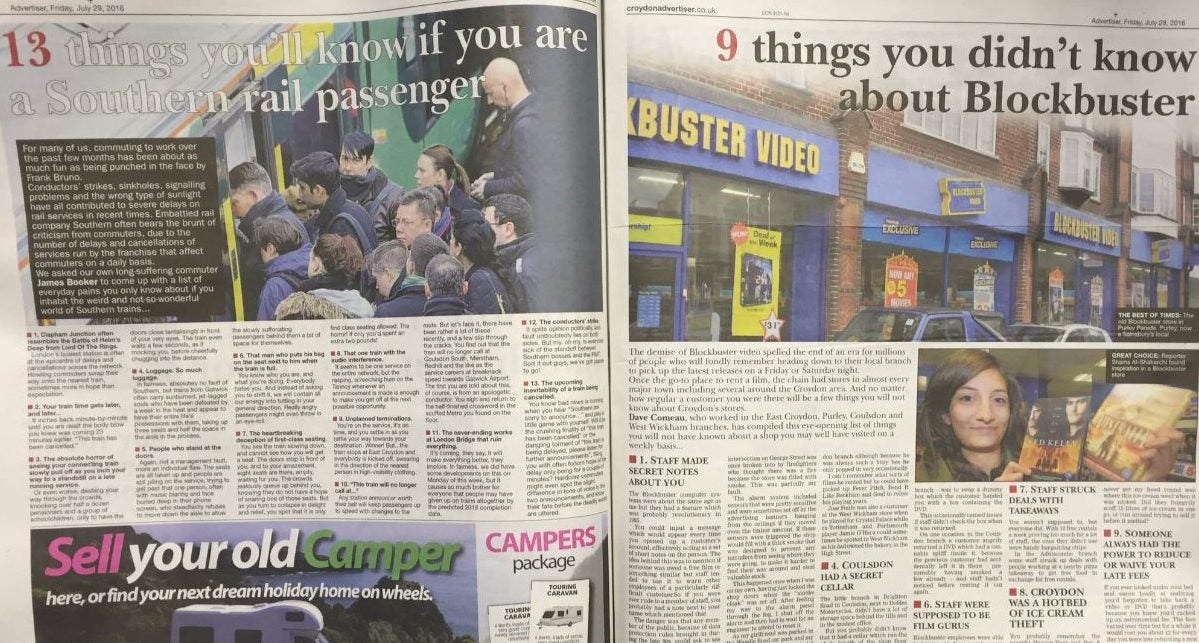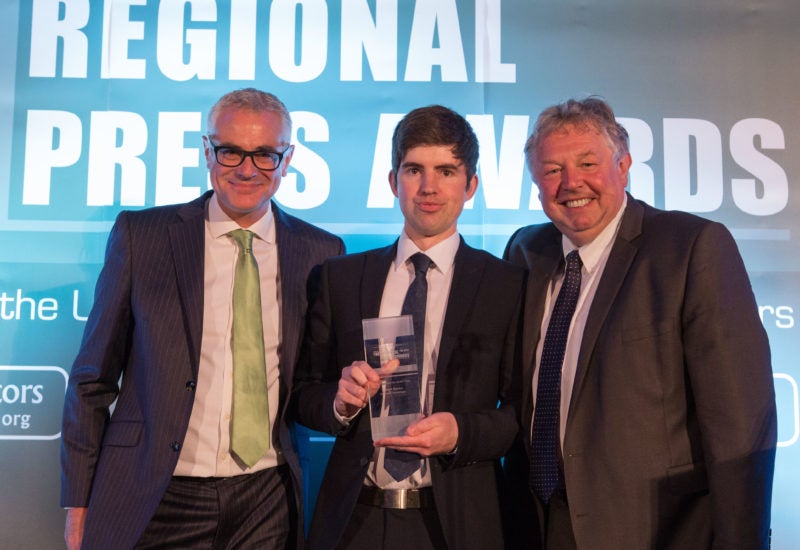
An award-winning local newspaper reporter has launched an excoriating attack on Trinity Mirror for reducing his paper to “listicles…scraped from the website”.
Gareth Davies took voluntary redundancy from the Croydon Advertiser in June. The company was apparently happy for him to leave, despite the fact that the 29-year-old has won regional press awards weekly reporter of the year four times.
The Croydon Advertiser is one of 80 former Local World titles which were taken over by Trinity Mirror last November in a deal which made the Daily Mirror publisher by far the UK’s largest local press group.
Since then it has cut dozens of journalism jobs on its new titles and created a web-first way of working which Davies believes has “destroyed” his former title.
He was moved to speak out on Twitter after seeing that the latest edition of his former paper had run “listicle” stories filling consecutive pages headlined:
13 things you will know if you are a Southern Rail passenger
9 things you didn’t know about Blockbuster.
Davies said this sort of content had made it into print because the paper now “consists entirely of stories scraped from website by subs and put in paper”.
He added: “Reporters no longer have any input or involvement in the paper product, including no chance to proofread.”
He said: “A paper with a proud 147-year history reduced to being a thrown together collection of clickbait written for the web.”
The Croydon Advertiser is a paid-for weekly selling just under 8,000 copies a week at 80p.
Davies said that under Trinity Mirror the paper now has no photographers and two reporters, who cover the rest of Surrey and Sussex as well as Croydon (which has a population on its own of 380,000).
Davies said: “Without any prior warning they were put on shifts, including working on Sundays. Every six weeks reporters have to work 12 consecutive days.
“The few reporters who are left are not allowed to meet contacts unless there is a guarantee of a story. They have to get permission from a non-editorial manager to claim travel expenses. They already work at least 30 mins away from patch, in poorly paid jobs.”
He added: “What do readers get in return? A website focused on live blogging everything, with reporters told to ‘write like they speak down the pub’.
“Well, it breaks my heart. I couldn’t stick around to watch the paper be destroyed & I would not help them do it.”

Gareth Davies collects his fourth Weekly Reporter of the Year award at this year’s Regional Press Awards 2016
The same process is apparently being repeated at former Local World titles across the UK.
At the Leicester Mercury, Trinity Mirror placed the entire five-strong features team at risk of redundancy. The Mercury has dominated the features category at the Regional Press Awards for a decade.
Former Croydon Advertiser editor of six years Glenn Ebrey backed up Davies’ account, saying on Twitter: “Tweets from @Gareth_Davies09 paint a very sad &, regrettably, accurate picture of what’s happening at paper I loved editing for six years.”
Davies said: “So if you read @CroydonAd, or just care about local papers, don’t just read my tweets, let Trinity Mirror know what you think.
“They think they can cobble together any old rubbish and sell it for same price and no one will care. Show them they’re wrong.”
Whilst Davies was at the Croydon Advertiser it led a campaign to successfully change the law to ensure more people are charged with driving whilst under the influence of drugs after the death of a local child.
Davies said: “Local press should be a vital part of democratic accountability and a force for change, not an exercise in generating clicks by any means.”
He said reporters at the Croydon Advertiser must now get permission to write stories which might attract less than 1,000 hits. He said that 70 per cent of stories fall into this category, including those which were part of his campaign which prompted the law change.
Trinity Mirror digital publishing director David Higgerson has responded to the Davies tweets in a blog post.
He said: “Has Trinity Mirror banned stories which will generate fewer than 1,000 page views? No (and in fairness Gareth doesn’t say that, although that’s the interpretation many have given).
“Has Trinity Mirror instructed reporters to get permission to write stories which generate fewer than 1,000 page views? No. Do we think it’s a good idea for the people who know a story and an area best (the journalists in the newsroom) to discuss how to ensure a story generates more than 1,000 page views? Yes.
“There are two reasons for this. The first is cold economics. Much of the revenue which funds our journalism comes from advertising which is dependent on page views. Another rump of it comes from local advertisers who need convincing that our brands have an impact online locally. Therefore, the more people who see a story locally, the greater chance we have of convincing local advertisers to jump on board.
“The second reason is about readers. A story which generates fewer than 1k page views will have been read by fewer than 1k people. According to ONS data, Croydon Council covers a population of 264k. So a story generating fewer than 1k page views will reach 0.4% of the local population at most. That’s not a strong place for a news publisher to be when it seeks to hold authorities to account.”
Email pged@pressgazette.co.uk to point out mistakes, provide story tips or send in a letter for publication on our "Letters Page" blog
